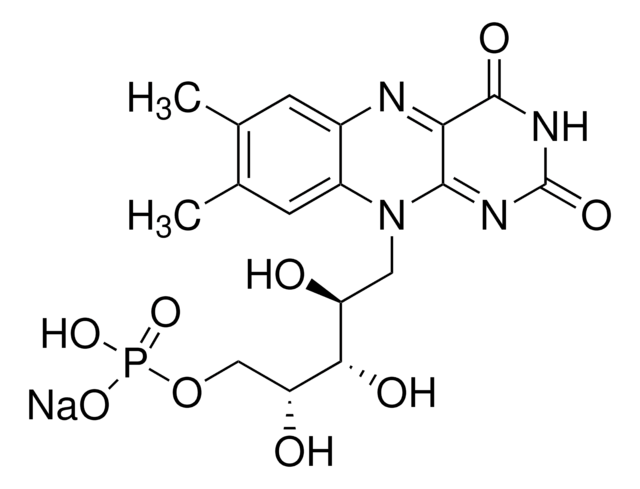Y0000757
Riboflavin for peak identification
European Pharmacopoeia (EP) Reference Standard
Synonym(s):
(−)-Riboflavin, Lactoflavin, Vitamin B2, Vitamin G
About This Item
biological source
synthetic
grade
pharmaceutical primary standard
Agency
EP
API family
riboflavin
form
solid
manufacturer/tradename
EDQM
technique(s)
gas chromatography (GC): suitable
liquid chromatography (LC): suitable
mp
290 °C (dec.) (lit.)
application(s)
pharmaceutical (small molecule)
format
neat
storage temp.
2-8°C
SMILES string
CC1=C(C)C=C(N(C[C@H](O)[C@@H]([C@H](O)CO)O)C(C2=N3)=NC(NC2=O)=O)C3=C1
InChI
1S/C17H20N4O6/c1-7-3-9-10(4-8(7)2)21(5-11(23)14(25)12(24)6-22)15-13(18-9)16(26)20-17(27)19-15/h3-4,11-12,14,22-25H,5-6H2,1-2H3,(H,20,26,27)/t11-,12+,14-/m0/s1
InChI key
AUNGANRZJHBGPY-SCRDCRAPSA-N
Looking for similar products? Visit Product Comparison Guide
General description
Riboflavin, also known as vitamin B2, is crucial for human nutrition, and growth. It finds potential applications in biological redox reactions and is found in several foodstuffs, energy drinks, and vitamin formulations.
Application
Packaging
Other Notes
related product
Storage Class Code
11 - Combustible Solids
WGK
WGK 1
Flash Point(F)
Not applicable
Flash Point(C)
Not applicable
Regulatory Listings
Regulatory Listings are mainly provided for chemical products. Only limited information can be provided here for non-chemical products. No entry means none of the components are listed. It is the user’s obligation to ensure the safe and legal use of the product.
JAN Code
Y0000757:
Y0000757-1EA:
Choose from one of the most recent versions:
Certificates of Analysis (COA)
Sorry, we don't have COAs for this product available online at this time.
If you need assistance, please contact Customer Support.
Already Own This Product?
Find documentation for the products that you have recently purchased in the Document Library.
Customers Also Viewed
Our team of scientists has experience in all areas of research including Life Science, Material Science, Chemical Synthesis, Chromatography, Analytical and many others.
Contact Technical Service


